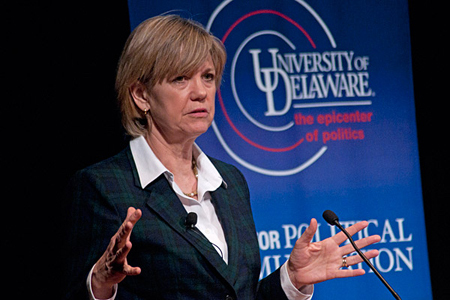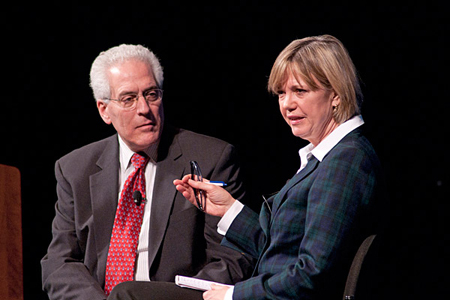Intelligence boom
Washington Post’s Dana Priest discusses intelligence industry

The aftermath of 9/11 saw national security become a boom industry with the emergence of a massive “military intelligence complex” and no end to taxpayer-funded growth in sight, the Washington Post‘s Dana Priest told a large University of Delaware Global Agenda speaker series audience Wednesday night at Mitchell Hall.
Priest, a two-time Pulitzer Prize winner and author of the book Top Secret America, said the national security apparatus – both the government bureaucracy and the huge number of private contractors on which it has come to rely – is so enormous that even the federal government is unsure how many contractors work for it.
Both the work itself and the substantial costs associated with it are hidden behind “a thick wall of classification.
If the recession has led to cuts in the national security budget, Priest joked, “you and I will be the last to know.”
She said the expenditures can only be reined in when the nation is prepared to have a realistic discussion about the fight against terrorism – what works, what doesn’t, what programs should be retained and what programs should be cut.
Priest said she understands the need for vibrant and vigilant national security, and said that today “we are absolutely safer” than we were in September 2001.
But, she said, that is not because of the growth of the giant military intelligence complex — a phrase chosen to recall President Dwight D. Eisenhower’s concerns about the military industrial complex — but because within it there are smaller but finely tuned agencies that “have made great strides.”

A complex story
Priest said the 9/11 attacks “changed the world in so many ways,” and that in the immediate aftermath the federal government was in panic mode as people questioned how the Central Intelligence Agency and Federal Bureau of Investigation could have failed to see what was coming.
Soon thereafter, in an effort to track down and bring to justice those involved, President George W. Bush set in motion “the largest covert operation in U.S. history” — larger than that in World War II and larger than that in the Cold War.
Congress was more than willing to assist, Priest said, “opening the wallets” with more funding than the existing agencies knew what to do with. There was a caveat, she added: “Here’s a lot of new money but whatever you do, don’t grow government.”
That didn’t leave many options other than to hire private contractors, and she said there was a splurge in the hiring of people in the private sector, “many of whom didn’t have a clue what they were doing.”
The private contractors, of course, realized this new field was a gold mine and even well established Department of Defense partner corporations turned their attention to the burgeoning industry, she said.
Such was the growth that the federal government felt the need to create a new agency to keep track of the contractors and created the Office of the Director of National Intelligence. Although the director was given no real power, the office has grown exponentially and now occupies a 500,000-square-foot building in McLean, Va.
The creation of the office, coupled with the advent of the Department of Homeland Security, meant that in addition to providing funding to large numbers of private contractors the U.S. had created two large new bureaucracies. And, said Priest of the federal offices, “their role in finding and stopping terrorists is not clear” to a lot of people.
She likened the explosion of national security agencies and firms to a soccer game in which children are chasing a ball without any direction.
The federal government is being “flooded with mediocre information” with “no one really in charge of counterterrorism.”
It is difficult for the public to get a handle on what is happening, Priest said, because there has been created “a top secret world, with its own culture, its own ethics, its own money flow that you and I can’t see.”
Top Secret America
For detailed information from the Washington Post‘s Top Secret America series, see the website. Priest is co-author of the series and the book of the same name with fellow Post reporter William M. Arkin.
About Global Agenda
The theme of the spring Global Agenda series is “Spies, Lies and Sneaky Guys: Espionage and Intelligence in the Digital Age.”
Global Agenda is presented by the Institute for Global Studies, the Department of Communication, the Department of Political Science and International Relations and the Center for Political Communication.
Talks are moderated by Ralph Begleiter, director of the Center for Political Communication.
Presentations are held at 7:30 p.m., Wednesdays, in Mitchell Hall and are free and open to the public.
The series will continue Wednesday, March 14, with a presentation “Electronic Underworld” with Gen. Michael Hayden, former director of the CIA and former director of the nation’s most secretive intelligence organization, the NSA. Appointed by Presidents Clinton and Bush, Hayden led those agencies between 1999-2009, during the 9/11 attacks and aftermath and the Afghanistan and Iraq wars.
